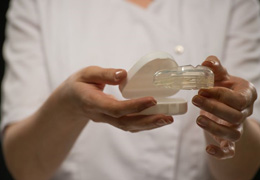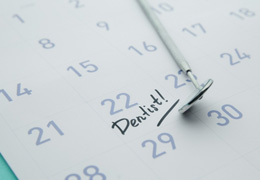Dental Implants — Prestonsburg, KY
Strong & Beautiful Tooth Replacement
When it comes to replacing missing teeth, dental implants are truly in a class of their own. A small, titanium post is placed into the jawbone to recreate the root of a missing tooth, and this is used to support a number of restorations that can replace any number of teeth. Dental implants are the only treatment option that restores an entire tooth, and as a result, they are the next best thing to nature. Dr. Griffith is able to provide complete implant care right here in Prestonsburg so patients can get everything they need in one convenient dental office location. To learn more about this strong and beautiful tooth replacement option and what it could do for you, contact us today for an implant consultation appointment.
Why Choose Brookside Dental Care For Dental Implants?
- FREE No-Obligation Dental Implant Consultation
- Start-To-Finish Dental Implant Treatment for Your Convenience
- Financing & In-Office Savings Plan Available to Make Treatment Affordable
What Are Dental Implants?
Natural teeth are made up of two primary parts: there’s the visible crown that you see when you smile and the hidden roots underneath that keep it anchored in place. Traditional tooth loss solutions like dentures and dental bridges only replace the crowns of missing teeth, leaving a lot to be desired in terms of functionality and comfort. On the other hand, dental implants are designed to mimic the entire structure of a missing tooth both above and below the gumline!
Dental implants are small titanium posts that can be surgically inserted into the jawbone where a missing tooth once was. This effectively replaces the root system and provides a strong, lifelike foundation for your replacement teeth. On top of the implant and above the gumline, a custom-made restoration is attached via a small connector piece called an abutment. Depending on how many dental implants you’re getting, you can get a crown, bridge, or denture to replace any number of missing teeth! The end result is a beautiful smile that looks, feels, and functions just like natural.
The 4 Step Dental Implant Process

The dental implant process is somewhat complex, and it can take several months or longer from beginning to end. It might seem like a big commitment, but you can look forward to truly worthwhile results! What exactly can you expect throughout your treatment journey? While the details of the process can vary from case to case, most patients must go through four main steps: an initial consultation, dental implant surgery, osseointegration, and restoration.
Initial Dental Implant Consultation

During this first appointment, our team will gather information about your oral health, your medical history, and your goals for treatment. We may also take some X-rays so we can understand the state of your jawbone health.
Based on what we discover, we can start planning the details of your treatment. We will let you know whether you require any preliminary services, such as bone grafting or gum disease therapy, before you get implants. We can also tell you how many implants you may need.
Feel free to ask questions during your consultation — we want you to feel well-informed!
Dental Implant Surgery

Dr. Griffith and our team perform this surgery right here at Brookside Dental Care, so you will not need to worry about being referred to a specialist whom you have never met.
The procedure itself is fairly straightforward. First, we will make sure you are comfortable by administering local anesthesia and, possibly, sedation, if you choose. Then, we will place the implants at pre-planned locations through your gums into your jawbone. Before you head home, we will make sure you have detailed instructions for your post-operative recovery period. Most patients are able to go back to work the next day.
Dental Implant Osseointegration & Abutment Placement

The soft tissue at your implant sites should heal fairly quickly, but it may be a few months before your bone completely recovers. Throughout that time, a remarkable process known as osseointegration will take place. Essentially, this means that your body will be forming a strong bond with your implants.
After adequate osseointegration has occurred, you might need to undergo a second minor surgery, wherein we will place abutments (small connector pieces) on top of your implants. Some patients get abutments during their initial implant procedure, so this additional surgery is not necessary in all cases.
Delivery of Dental Implant Restorations

This is the most exciting part of the dental implant process! Our team will take detailed impressions of your mouth and work with a laboratory to create your new teeth, whether you are receiving a crown, bridge, or denture. After your restoration is ready, we will double-check it to make sure that it meets our strict quality standards. Then, we will attach it to your implants. We will give you some instructions to help you take care of your new smile, and then we will let you go so you can start enjoying all the wonderful benefits that dental implants have to offer.
Benefits of Dental Implants

Dentists and specialists throughout the U.S. place an average of more than 5 million dental implants each year. When you consider all the benefits that this treatment has to offer, it is easy to understand why it is so popular. What might it be able to do for you? Below, you’ll find information about the benefits of dental implants in Prestonsburg as they relate to daily quality of life, oral and overall health, and long-term advantages.
Day-to-Day Benefits

Some of the top everyday benefits of dental implants include:
- Strong chewing ability. Dental implants are incredibly sturdy, so you can use them to chew even tough and hearty foods — including foods that traditional dentures may not be able to handle.
- A natural appearance. Your implant dentist in Prestonsburg will carefully design your implant-supported crown, bridge, or denture so it complements your remaining natural teeth and blends in seamlessly with your smile. Plus, you will be able to avoid the sunken facial appearance that commonly occurs after tooth loss.
- No slips. When traditional dentures do not fit well, they can easily slip out of place, causing discomfort and embarrassment. Dental implant restorations are so secure that you will be able to speak and eat without worry.
- Easy maintenance. In many ways, caring for dental implants is similar to caring for natural teeth. A thorough oral hygiene routine, along with regular dental visits, has the potential to keep your smile problem-free for the long haul.
Health Benefits

Dental implants in Prestonsburg offer benefits for both oral and overall health:
- Jawbone preservation. After the loss of natural teeth, the jawbone begins to lose its density and volume. Traditional dentures can accelerate the bone loss. Dental implants, on the other hand, stimulate the bone and help to keep it healthy and whole.
- A balanced diet. Because you will be able to eat a wide variety of foods, you can enjoy the disease-preventing benefits of a healthful diet.
- Traditional dentures may cause gum sores, especially if they do not fit well. Dental implants do not have that issue.
- Protection for your natural teeth. Dental implants can prevent your natural teeth from drifting out of place. Also, placing implants usually does not require that any of the nearby teeth be modified or extracted.
Long-Term Benefits

You can begin to enjoy the benefits of dental implants as soon as you receive your restorations, and they should continue to serve you well for many years. Some of their long-term benefits include:
- With proper care, dental implants have the potential to last a lifetime. The restorations on top of them can also last for quite a while.
- Save money. Although dental implants cost more upfront than traditional forms of tooth replacement, they last so long that they may actually be a better monetary value.
- Save time. The easy maintenance of dental implants will spare you from having to spend countless hours on maintaining them. You’ll have more time to enjoy all the wonderful things that life has to offer.
Who Dental Implants Can Help

If you are a healthy adult with a strong jawbone and one or more missing teeth, there’s a great chance that dental implants in Prestonsburg can help you! This versatile treatment can be used to address any level of tooth loss. First, we’ll make sure you’re a good candidate for dental implants during your initial consultation and help you schedule any necessary preliminary treatments. Then, we can move on to planning your dental implant treatment around how many teeth you’re missing.
Who Is a Good Candidate for Dental Implants?

Typically, candidates for dental implants:
- Have fair overall health. You should be well enough to recover from minor surgery.
- Have good oral health. It is important that you are free of gum disease and other significant oral health problems because such issues could interfere with the long-term success of your implants.
- Have a strong, thick jawbone. Your jawbone must be strong enough and thick enough to accommodate your dental implants.
- Stick to good habits. Non-smokers with excellent oral hygiene habits are likely to keep their dental implants for a lifetime.
Even if you do not believe that you are an ideal dental implant candidate right now, we still invite you to come in for a consultation. The vast majority of adults do qualify for implants, either right away or after some preliminary treatments.
Missing 1 Tooth

Replacing a single tooth tends to be a straightforward procedure in most cases. We insert a dental implant into the jawbone and later, we top it with a custom-made dental crown. Because this new tooth will have a two-part structure similar to that of the natural teeth surrounding it, it will seamlessly blend into the smile.
Unlike a traditional bridge, an implant crown doesn’t require support from the neighboring teeth — which means that those nearby teeth usually do not have to be modified in any way. Implants also tend to last longer and provide more natural function than regular bridges.
Missing Multiple Teeth

Fortunately, implants are not limited to just restoring single teeth. Several consecutive missing teeth can be replaced without altering the surrounding healthy teeth thanks to an implant bridge. A dental implant is positioned on each side of the gap in your smile and topped with a crown. Prosthetic teeth are connected to the crowns to fill in the space.
If your missing teeth are not consecutive, you might qualify for an implant-supported partial denture or a few strategically placed implant crowns. As your dental implant dentist in Prestonsburg, we will adapt your treatment to your unique needs.
Missing All Teeth

Tired of constantly having to use adhesive for your loose, ill-fitting denture? Dental implants can help you finally get a solution you can rely on. With implant dentures, a full denture is anchored directly onto a few well-placed implants. Because of this, they have a security and stability that regular dentures simply can’t match, and they can restore much more of your natural bite force.
There are a few different types of implant dentures, including those that are permanently attached to the implants that support them, as well as those that are easy to remove without professional assistance.
Maintaining & Caring for Your Dental Implants

Dental implants are designed to stand the test of time. In fact, they have the potential to last for several decades. But they can only reach that potential if you take some simple steps to keep them in good condition. Here are some tips to reduce the risk of harm to your implants and the surrounding tissues.
Make Oral Hygiene a Priority

Good oral hygiene can reduce the number of harmful bacteria in your mouth and lower your risk of a dangerous infection. You should:
- Thoroughly brush your teeth twice a day with a soft brush and low-abrasive toothpaste. Be sure to clean the area along your gumline.
- Clean around your restorations. You should floss between your natural teeth. If you have an implant bridge, you may need to clean underneath it with a water flosser or sulcus brush.
Eat a Healthy Diet

Even though dental implants can allow you to eat virtually any food, a degree of caution is still in order. You should avoid overindulging in sugary and starchy foods that can encourage plaque accumulation. You should also be careful with hard foods that might break your restorations. Try to center your diet on foods that promote oral and overall health, such as those that are rich in calcium and antioxidants.
Break Bad Habits

A few bad habits that might adversely affect your dental implants include:
- Research shows a significant relationship between smoking and an increased risk of dental implant failure.
- Using your teeth as tools. Using your teeth to open packages or carry out other tasks (besides eating) could damage your implants.
- Chewing on hard objects. If you have a nervous habit of chewing on your fingernails, pen caps, ice, or similar items, you should do all you can to quit.
Protect Your Dental Implants

You might need to wear a mouthguard to protect your implants and their restorations. For example, if you tend to grind your teeth at night, you might need a special nightguard to place a protective barrier between your upper and lower teeth. If you play sports, you should get a guard to reduce your risk of oral injuries. Keep in mind that custom mouthguards from a dentist are more comfortable and effective than over-the-counter options.
Schedule Regular Dental Checkups

Even if you no longer have any natural teeth, you should still visit our team for a checkup twice a year. During these routine visits, we will make sure that your dental implants and oral tissues are healthy. If we notice any causes for concern, we will recommend prompt treatment. We can also remove your implant restorations to clean your abutments and provide personalized tips on how to care for your mouth at home.
Understanding the Cost of Dental Implants

The overall cost of an implant procedure can vary quite a bit from patient to patient depending on a few determining factors, such as how many teeth a patient wants to have replaced, the location of those teeth, and if they require any preparatory procedures (such as extractions or a bone graft to build up the jaw).
What is important to remember, however, is that despite costing more upfront, dental implants can be the most cost-effective replacement thanks to their longevity. Traditional bridges and dentures typically need to be replaced every 7-10 years. With proper maintenance, good health and excellent home care, implants can last for 30 years or more. Over time, this results in a much lower cost for a patient.
Dental Implant FAQs
If you have one or more missing teeth, our Prestonsburg dental team is ready to help you rebuild a complete smile with dental implants. Before you attend a consultation, though, we completely understand if you want to gather more information. After all, dental implants are a big commitment! Below, you will find answers to some relevant FAQs. If your specific questions are not included here, reach out to our team directly — we will be happy to speak with you.
How Long Do Dental Implants Last?
Dental implants are designed to last a lifetime. Many patients have them for decades without any problems. The crowns, bridges, and dentures that get attached to dental implants can also last for years.
Of course, you must take good care of your implants if you want them to stand the test of time. Regular dental checkups, thorough oral hygiene, and other good habits are all important. Our team will be happy to provide personalized advice on how you can protect your implants from harm so they can serve you well for many years to come.
Are Dental Implants Safe?
Dental implants are not completely risk-free (no medical procedure is), but they are a low-risk procedure for the following reasons:
- We perform a thorough examination to look for risk factors that might affect the treatment’s outcome. If we notice signs of gum disease, low bone density, or other concerns, we will do all we can to address them before implant placement.
- We are very careful during the placement surgery. We do all we can to ensure that the implants are placed at the correct angle, depth, and location.
- Implants are biocompatible. Dental implants are made of materials that have been proven to work well within the human body.
What Can Cause Dental Implants to Fail?
The most common cause of dental implant failure is an infection known as peri-implantitis. It happens when bacteria attack the gums and bone around an implant, causing it to lose its base of support. Often, poor oral hygiene is a contributing factor to the development of peri-implantitis.
Implant failure may occur for other reasons as well, such as physical trauma or underlying medical conditions that interfere with osseointegration.
Our team can give you tips to keep your risk of implant failure to a bare minimum.
How Long Does It Take to Recover from Dental Implant Surgery?
People tend to heal at different rates. Most patients are able to go back to work within a day or two of their surgery (you may need to take more time off if your job involves a lot of physical activity). Some soreness and swelling may last for a week or two.
The soft tissue at your implant sites should heal fairly quickly, but it may take several months for your bone to heal and form a bond with your implants. For most of that time, your mouth should feel comfortable and normal.
Our team will provide detailed post-op instructions to help you enjoy a smooth recovery period.
